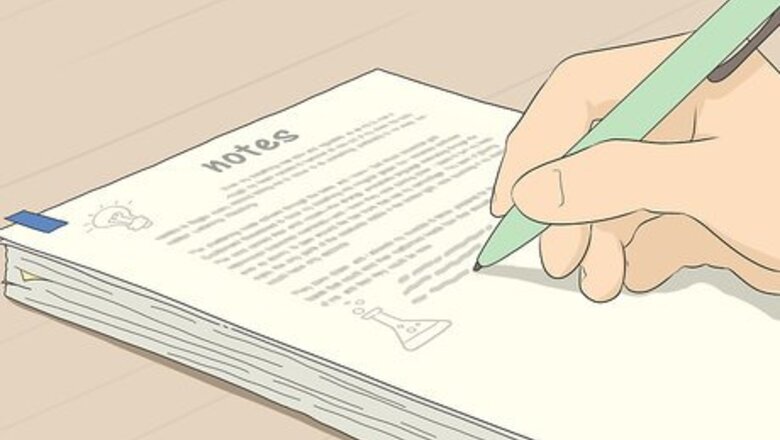
views
Take notes on class material.
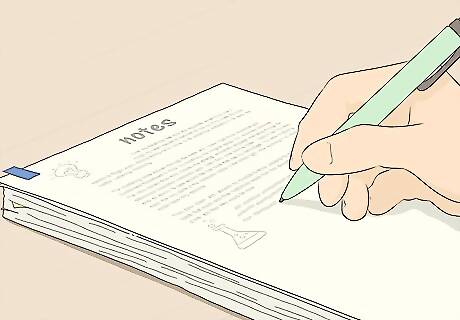
Take notes to help you remember and understand what you learn. Taking notes helps you remember what you hear or read, but it also helps your brain stay active and absorb information adequately. Write down key points mentioned by your teacher or the textbook, and make note of questions you have about the material while you read.Did you know? Doodling while you take notes can actually improve your focus and help you remember more of what you hear! Although typing your notes can be quicker and easier, writing your notes by hand may help you absorb and remember the material better. Kaifesh recommends taking notes on recorded lectures, if possible. That way, you can take your time looking up related concepts as you go.
Ask lots of questions.

When you don’t understand something, raise your hand. It’s your teacher’s job to help you learn and understand, so don’t hesitate to ask them questions! Asking questions will not only help you learn the material better, but will also show your teachers that you’re engaged and interested. If you’re too shy to raise your hand and ask questions during class, try approaching your teacher after class or sending them an email. There’s a good chance another student has the same question, so don’t worry about sounding ignorant or foolish. Teachers love it when you help them teach you! If you’re in college or university, your instructor may have office hours when you can ask them questions and discuss the material with them one-on-one.
Make time for your schoolwork.
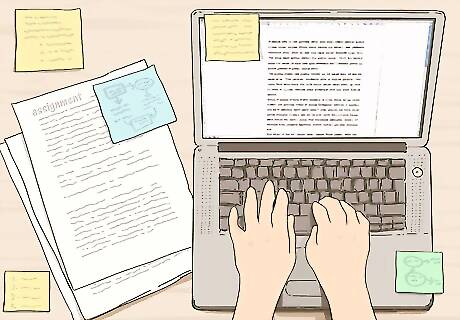
Plan time to keep up with your homework assignments. Kaifesh says to “Set aside time—by class, by assignment, by day—to ensure that you are allotting enough time to do each well before the due dates.” It can be easy to get swamped and lose track of all the work you’re supposed to be doing, so write down each assignment and plan when you’ll get it done as soon as it’s assigned. Keep in mind that homework is intended to help you learn and practice the material; it’s not just busywork! Ask a friend if they want to do homework together, which can help you better understand it and motivate you to get it done. EXPERT TIP Jennifer Kaifesh Jennifer Kaifesh Founder, Great Expectations College Prep Jennifer Kaifesh is the Founder of Great Expectations College Prep, a tutoring and counseling service based in Southern California. Jennifer has over 15 years of experience managing and facilitating academic tutoring and standardized test prep as it relates to the college application process. She takes a personal approach to her tutoring, and focuses on working with students to find their specific mix of pursuits that they both enjoy and excel at. She is a graduate of Northwestern University. Jennifer Kaifesh Jennifer Kaifesh Founder, Great Expectations College Prep Expert Warning: Don't lose easy points because you failed to turn in an assignment or turned it in late.
Participate in class.

Maintain good attendance and stay actively engaged in class. Attend class every day if you can, and when you’re there, make sure you’re paying attention and participating by asking or answering questions. Even if attendance isn’t mandatory in your classes, showing up will ensure you learn more and don’t miss anything important. If you do have to miss class, reach out to your teacher or a classmate to find out what you missed so that you can review it. Someone might be willing to share their notes with you. It can be tempting to skip class, but keep in mind that attendance often counts toward your grade, and missing a class is the quickest way to fall behind.
Find an extracurricular activity.
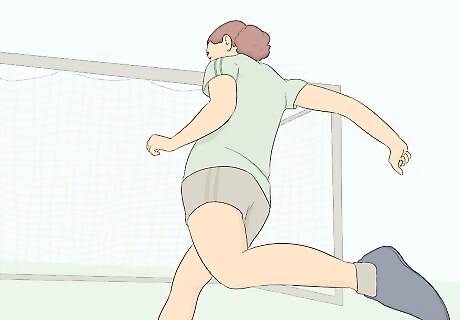
Participate in extracurricular activities to make school more fun. Consider choosing an extracurricular like school clubs, sports teams, or student committees. These activities can be fun and enriching, and studies show that students who do them also do better in school overall. Plus, they’re also a good way for you to get to know your teachers and fellow students. Extracurriculars also look great on college applications, or even job applications.
Study in frequent, small bursts.

Quiz yourself on the material regularly to help you absorb it. Don’t wait to study for a quiz or test the night before. You’ll remember the material better if you regularly review what you learn throughout the week in shorter study sessions. This also helps you identify your weak points so that you’ll know where to focus during review. Try different methods of testing your knowledge, such as: Making flashcards to quiz yourself on key concepts Having a friend ask you questions and trying to answer them Taking advantage of quizzes and knowledge checks in your textbooks Taking practice tests or quizzes, if your teacher provides them
Get comfortable when you work.

Study for tests in a quiet place without distractions like your phone. Kaifesh says to have a snack, get your social media scrolling or other distractions done, then put those things away and start studying. To help you stay focused, look for a place to study where you won’t be bothered by noise or interruptions. Your study space should also be tidy, well-lit, and not too hot or too cold. Kaifesh also recommends listening to music, but only if it helps you concentrate. Try classical music, or music without lyrics. If you’re too tempted to play with your phone, try installing a productivity app that will limit your access during study time, like Forest or Brick. If you’re studying at home, let other people in your home know that you need quiet time without distractions while you’re studying or doing homework.
Take plenty of breaks.
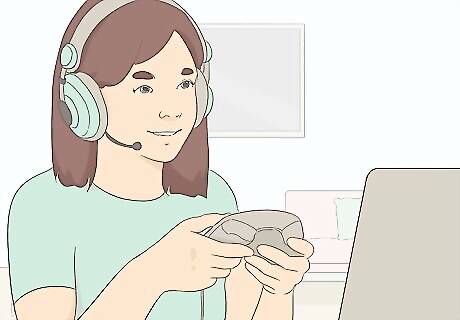
Take frequent breaks while you do homework or study. When you’re working or studying, take a 15 to 20-minute break every hour or so. This helps to re-energize you and get you back on track if your mind starts to wander. During your break, you can get up and walk around, have a healthy snack, watch a short video, or even put your head down for a quick power nap. Going for even a short walk can give your brain a boost and improve your problem-solving and creative thinking skills!
Keep a calendar.
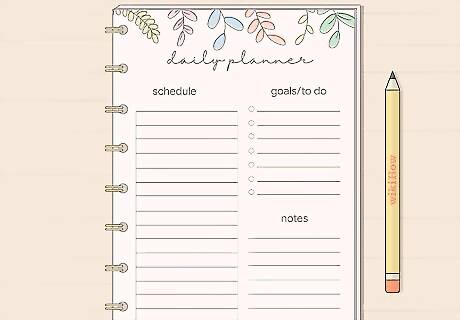
Use a planner to keep track of your class and study schedule. If you’re taking a lot of classes, keeping a daily or weekly planner helps you keep track of them all. Sit down at the beginning of the term and write out your class schedule or any other regularly occurring event, like extracurriculars. Then, as the semester goes on, schedule things like homework, studying, and relaxation. Also include important dates and deadlines that might be included on your class syllabi, like upcoming tests or projects. A physical planner is handy, but you might also use your phone’s calendar app and schedule notifications to help remind you. EXPERT TIP Alicia Oglesby Alicia Oglesby Professional School Counselor Alicia Oglesby is an Academic Counseling Expert based in Pittsburgh, Pennsylvania. She is currently pursuing a PhD in Education at the University of Pittsburgh and working as a Graduate Research Assistant. She was previously employed as the Associate Director of College Counseling at the Winchester Thurston School. Prior to that, she worked as a Director of School and College Counseling at 4 other secondary schools. With over twelve years of experience in academic counseling, Alicia specializes in academic advising, social-emotional skills, and career counseling. Alicia holds Professional School Counseling Certifications in both Washington DC and Pennsylvania. She has created a college counseling program in its entirety and developed five programs focused on application workshops, parent information workshops, essay writing collaborative, peer-reviewed application activities, and financial aid literacy events. Alicia holds a BS in Psychology from Howard University and a Master’s in Clinical Counseling and Applied Psychology from Chestnut Hill College. Alicia Oglesby Alicia Oglesby Professional School Counselor Set up systems for organizing schoolwork. Use colored pens to code school subjects in planners and matching folders. Set phone alerts for tests, projects, and assignments, so you stay on top of work. Handwrite to-do lists by due date and class to help retain the information.
Prioritize your assignments and other responsibilities.
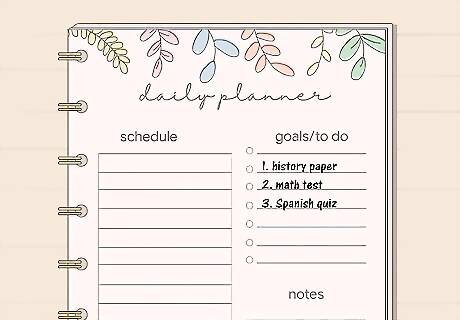
Complete time-sensitive or difficult assignments first. When you have a lot of things on your plate, it can be hard to know where to begin. To avoid feeling overwhelmed or stuck, create a to-do list and put your most difficult or urgent assignments at the top. Once you’ve dealt with those, move on to smaller and less urgent items on the list.Tip: When you’re tackling a big project, try breaking it up into more manageable steps. For example, if you need to write an essay by the end of the week, break it down into steps like doing research, writing an outline, and drafting your essay. For example, if you have a big math test coming up tomorrow, you might put reviewing for the math test at the top of your list. Reviewing this week’s French vocabulary words can go lower on the list.
Keep your school supplies organized.

Make a system for your textbooks, notebooks, and other supplies. In addition to organizing your time, it’s also important to organize your things. Keep your textbooks, notes, handouts, school supplies, planners, and anything else you need together in one place so that you can find them easily when you need them. To keep track of your notes, handouts, and assignments, try using a binder with different sections for each class. Set up a tidy, designated spot for doing school work so that your books and papers don’t end up scattered in different places.
Make sleep a priority.

Stay rested to do better in class. You won’t do well in school if you’re too exhausted to focus. Studies show that students who get enough sleep also get better grades. Plan to go to bed early enough each night so that you can get 9-12 hours of sleep if you’re a kid, 8-10 if you’re a teen, and 7-9 if you’re an adult.Did you know? While you sleep, your brain processes the information you learned during the day. Sleeping is an important part of absorbing and remembering the things you learn in school! To help you sleep better, establish a relaxing bedtime routine, like doing light yoga, meditating, or taking a warm bath before bed. Try to go to bed and wake up at the same time every day. Practice good sleep hygiene by turning off bright screens at least half an hour before bed, avoiding caffeine and other stimulants late in the day, and keeping your room quiet, dark, and comfortable at night.
Remember to eat healthy and stay hydrated.

Eat 3 nutritious meals per day, and carry a water bottle. If you’re not getting enough to eat or drink, you’ll feel tired, unfocused, and irritable. Make sure to eat at least 3 balanced meals and drink about 8 glasses of water during the day—don’t go overboard on sugary drinks. It’s especially important to have a nutritious breakfast so that you start your day energized and ready to learn. In every meal, try to include: Fresh fruits or vegetables Whole grains Lean proteins, like chicken breast or fish Healthy fats, like those found in fish, nuts, and vegetable oils
Practice self-care.

Do stress-relieving activities to boost your mentality. School is stressful, so take time to unwind and do things you enjoy. You’ll do much better in school if you aren’t tense and anxious all the time. Some good stress-relieving activities include: Doing yoga or meditating Going for walks and spending time outdoors Spending time with friends, family, and pets Working on hobbies and creative projects Listening to music Watching movies or reading books
Reward yourself for your work.

Keep yourself motivated by celebrating your wins. When you get something done, take the time to celebrate! This will help motivate you to keep studying and working hard. Remember to reward yourself for your small achievements as well as your big ones. For example, after an hour of studying, you might reward yourself with a favorite snack or a few minutes of funny videos on YouTube. If you do well on a big test, you could celebrate by going out for pizza with your friends.
Stay optimistic.

Practice positive thinking, and avoid dwelling on your mistakes. Having a positive attitude about school will not only make your experience less stressful but will also help you do better in your classes. If you find yourself thinking negatively about school or the subjects you’re studying, try to replace the negative thoughts with more positive ones. For example, instead of thinking, “I hate math! I’ll never be good at it,” try replacing that thought with “This is really challenging, but if I work hard, I’ll keep getting better at it!” Scientists have found that keeping a positive attitude may actually help your brain’s memory center work better!
Ask for help.

Reach out for support if you need it. If the stress of school is getting to you, you don’t have to struggle with it alone. Discuss study strategies with your teacher, or talk to your friends or family about how you’re feeling, and let them know if there are ways they can help. If you need extra help or don’t have a strong support network, find out if your school has a counselor you can talk to. Sometimes just talking to a friend about how you’re feeling can help you feel better. Don’t be afraid to ask for practical support, either. For example, you could say, “Mom, I’m really stressing about this test. Can you take a few minutes and quiz me with some questions from the review sheet?”



















Comments
0 comment